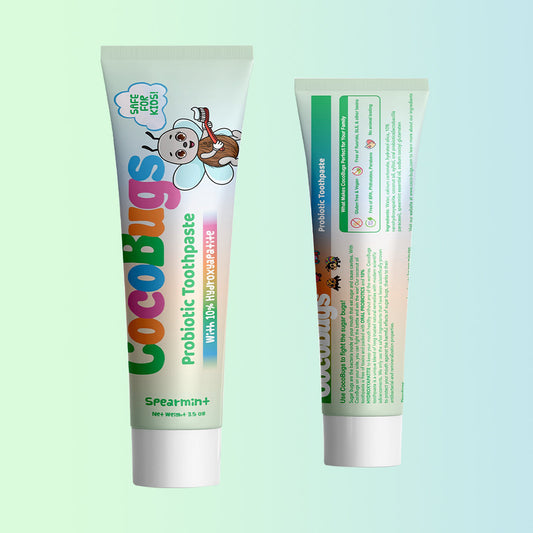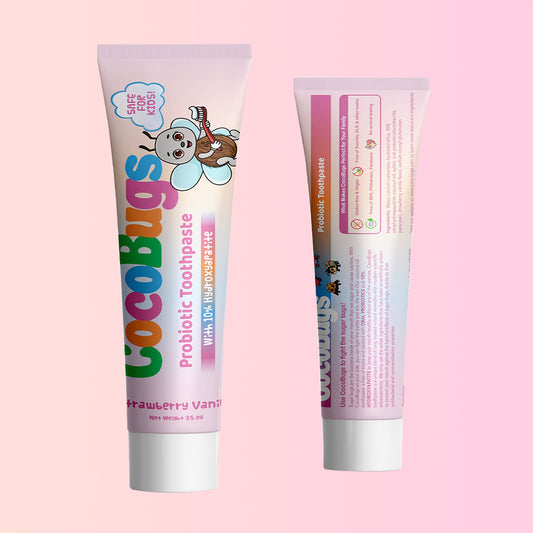ingredients we avoid
When reviewing toothpaste ingredients, caution is key. Even brands labeled "safe for infants" can harbor harmful chemicals. We steer clear of these ingredients for various reasons.
Fluoride
Controversial additive in US water and oral health products, health concerns prompt caution in use
reasons why we avoid it
- can cause dental and/or skeletal fluorosis
- Controversies over neurotoxic effects, especially in infants and children under 6
- potentially related to thyroid problems
Parabens and Phthalates
common preservatives and plastic enhancers in consumer products, respectively
reasons why we avoid it
- mimic estrogen hormones
- carcinogenic, potential breast cancer risk
- Toxic and endocrine-disrupting properties, damage reproductive systems
Triclosan
antimicrobial chemical Found in consumer products, banned in the eu but used in US toothpaste
reasons why we avoid it
- Endocrine disruptor, affects hormone function
- potentially carcinogenic
- may make certain bacteria resistant to antibiotics
Titanium Dioxide
mineral coloring agent, Prohibited as a food additive in the EU
reasons why we avoid it
- potentially carcinogenic
- Genotoxic effects observed in studies, raising concerns about potential harm to cellular DNA
Artificial Sweeteners - Aspartame and Saccharin
considered safe by FDA in small amounts but classified as potentially carcinogenic by WHO
reasons why we avoid it
- potential carcinogenic risks
- no health benefits
- natural sugar alternatives (xylitol) are healthier and can help prevent cavities
Sodium Lauryl Sulfate (SLS)
Petroleum-derived foaming agent in US toothpaste, prohibited as food additive in eu
reasons why we avoid it
- safety concerns, especially in oral care
- can cause ulcers and irritations in the mouth
Propylene Glycol
synthetic liquid, commonly used to retain moisture in various products, faces tighter regulations in the eu due to health concerns
reasons why we avoid it
- key component of antifreeze
- can damage nervous system, liver, and kidneys when consumed in large quantities
Carrageenan
thickening agent derived from seaweed with no nutritional value
reasons why we avoid it
- Degraded form carcinogenic and inflammatory
- Contamination risks in approved "un-degraded" form
Diethanolamine (DEA)
foaming agent, found in antifreeze and break fluid, banned in EU cosmetics
reasons why we avoid it
- Linked to hormone disruption
- potential carcinogenic effects linked to gene expression and nitrosamine formation
Fluoride
Controversial additive in US water and oral health products, health concerns prompt caution in use
reasons why we avoid it
- can cause dental and/or skeletal fluorosis
- Controversies over neurotoxic effects, especially in infants and children under 6
- potentially related to thyroid problems
Parabens and Phthalates
common preservatives and plastic enhancers in consumer products, respectively
reasons why we avoid it
- mimic estrogen hormones
- carcinogenic, potential breast cancer risk
- Toxic and endocrine-disrupting properties, damage reproductive systems
Triclosan
antimicrobial chemical Found in consumer products, banned in the eu but used in US toothpaste
reasons why we avoid it
- Endocrine disruptor, affects hormone function
- potentially carcinogenic
- may make certain bacteria resistant to antibiotics
Titanium Dioxide
mineral coloring agent, Prohibited as a food additive in the EU
reasons why we avoid it
- potentially carcinogenic
- Genotoxic effects observed in studies, raising concerns about potential harm to cellular DNA
Artificial Sweeteners - Aspartame and Saccharin
considered safe by FDA in small amounts but classified as potentially carcinogenic by WHO
reasons why we avoid it
- potential carcinogenic risks
- no health benefits
- natural sugar alternatives (xylitol) are healthier and can help prevent cavities
Sodium Lauryl Sulfate (SLS)
Petroleum-derived foaming agent in US toothpaste, prohibited as food additive in eu
reasons why we avoid it
- safety concerns, especially in oral care
- can cause ulcers and irritations in the mouth
Propylene Glycol
synthetic liquid, commonly used to retain moisture in various products, faces tighter regulations in the eu due to health concerns
reasons why we avoid it
- key component of antifreeze
- can damage nervous system, liver, and kidneys when consumed in large quantities
Carrageenan
thickening agent derived from seaweed with no nutritional value
reasons why we avoid it
- Degraded form carcinogenic and inflammatory
- Contamination risks in approved "un-degraded" form
Diethanolamine (DEA)
foaming agent, found in antifreeze and break fluid, banned in EU cosmetics
reasons why we avoid it
- Linked to hormone disruption
- potential carcinogenic effects linked to gene expression and nitrosamine formation



